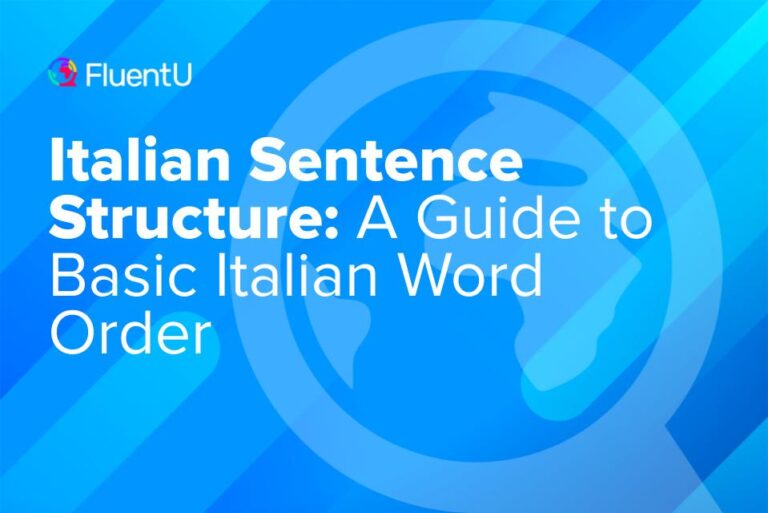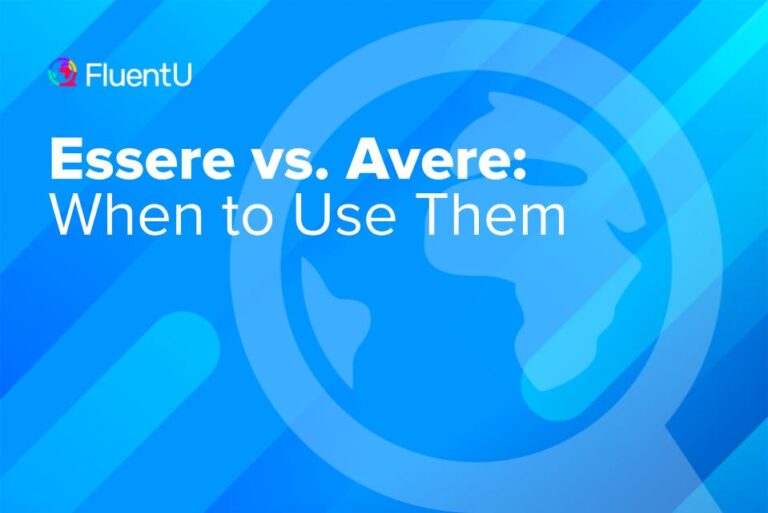Contents
- What Is a Cognate?
- What Is a False Friend?
- What Is a False Cognate?
- Different Endings of Italian Cognates
- -ty in English | –tà in Italian
- -ble in English | -bile in Italian
- -tion in English | -zione in Italian
- -ly in English | -mente in Italian
- -ic in English | -ico in Italian
- -ism in English | -ismo in Italian
- -al in English | -ale in Italian
- Vowel added to English word
- Cognates with different final vowels
- True English/Italian cognates
- Other English/Italian cognates
- How to Learn Italian Cognates
- And One More Thing...
125 Italian Cognates and Their Patterns
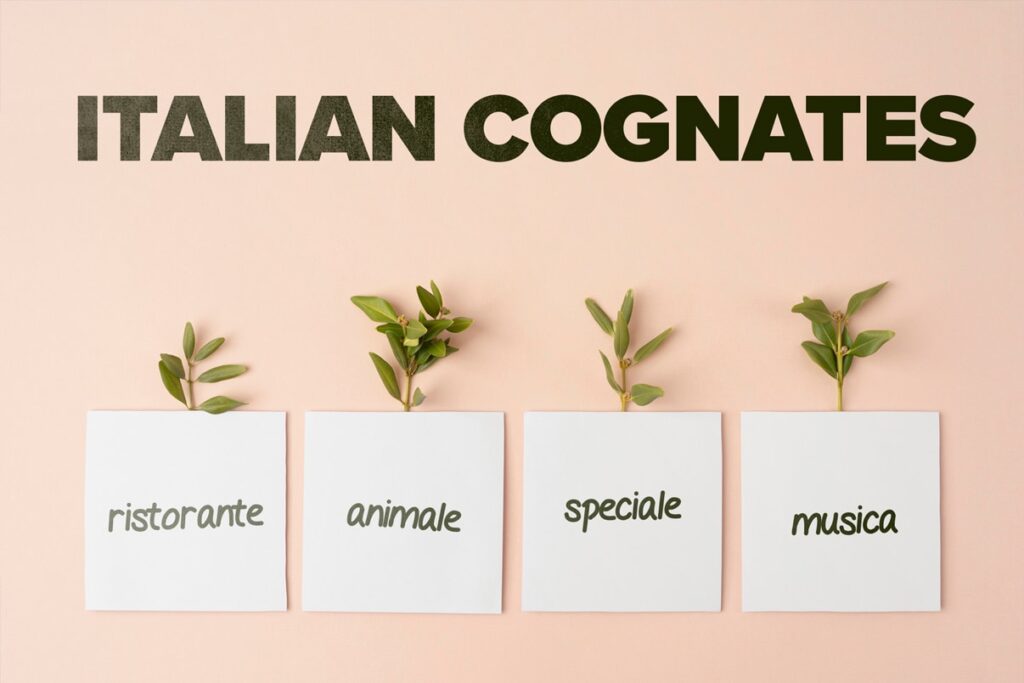
Cognates—words that have similar (or, in some cases, the same) spellings and pronunciations between two languages—are probably the easiest words to learn when studying a new language.
Cognates can give your Italian vocabulary a serious boost—as long as you don’t fall for “false friends.”
Let’s go over the differences between cognates, false friends and false cognates. We’ll also introduce 125 cognates between Italian and English and the patterns they follow.
Download: This blog post is available as a convenient and portable PDF that you can take anywhere. Click here to get a copy. (Download)
What Is a Cognate?
A cognate refers to two words from different languages that derive from the same original word. If you go back far enough, they have the same linguistic root. English and Italian have both been significantly influenced by Latin, which explains why there are many cognates between them.
Cognates are usually easy to recognize, learn and remember. They’re generally pronounced the same or similarly in both languages and their spellings tend to be similar as well. Most importantly, they have the same basic definition.
But of course, it can’t be that easy! Before you get too comfortable with cognates, you’ll need to learn about false friends and false cognates.
What Is a False Friend?
False friends are words that seem like cognates, and may even have the same root word, but actually have different definitions.
It’s easy to get confused when an Italian word that sounds similar in English has a completely different meaning. For instance, you might accidentally ask for a hotel room ( camera ) instead of a camera ( macchina fotografica )!
For this reason, you need to be mindful when learning cognates. Don’t assume that because a word sounds the same it has the same definition in both English and Italian. Check out our list of false friends between Italian and English to avoid using the wrong word.
What Is a False Cognate?
False cognates are different from false friends but can also cause plenty of confusion. False cognates are two words that may sound and look similar, and they may even have the same definition, but they come from different roots.
These words might be coincidentally similar or they may be a case of convergent evolution (words that came to be for similar reasons but are entirely unrelated) but they aren’t considered real cognates!
Cognates are useful when learning Italian as long as you know to be wary of false friends and false cognates. Otherwise, someone might tell you that they’re hungry ( fame ), but you might think instead that they’re famous.
Now that you know the difference between false friends, false cognates and cognates, let’s look at some examples.
Different Endings of Italian Cognates
One easy way to tell a cognate is by looking at word endings. Many English words that end in a particular way have Italian cognates that also end in a particular (slightly different) way.
Below are some examples of English/Italian cognates and the patterns they follow. Just remember that these are not hard and fast rules, but rather general things to look for.
-ty in English | –tà in Italian
There are many English nouns that end in -ty. And many of their equivalents in Italian are cognates ending in -tá.
| English | Italian |
|---|---|
| ability | abilità |
| authenticity | autenticità |
| brevity | brevità |
| city | città |
| community | comunità |
| diversity | diversità |
| durability | durabilità |
| felicity | felicità |
| generosity | generosità |
| maturity | maturità |
| publicity | pubblicità |
| quality | qualità |
| university | università |
-ble in English | -bile in Italian
By remembering this pattern and reviewing the English/Italian cognates that follow it, you can easily learn a lot of Italian adjectives that will come in handy in your daily speech.
| English | Italian |
|---|---|
| memorable | memorabile |
| adorable | adorabile |
| acceptable | accettabile |
| credible | credibile |
| excitable | eccitabile |
| fllexible | flessibile |
| impossible | impossibile |
| possible | possibile |
| responsible | responsabile |
| visible | visibile |
-tion in English | -zione in Italian
Here’s another category of nouns that have many English/Italian cognates, making your studying much simpler.
| English | Italian |
|---|---|
| situation | situazione |
| attention | attenzione |
| celebration | celebrazione |
| communication | comunicazione |
| education | educazione |
| information | informazione |
| liberation | liberazione |
| organization | organizzazione |
| population | popolazione |
| reaction | reazione |
-ly in English | -mente in Italian
Most adverbs in English end in -ly, and most adverbs in Italian end in -mente. With these convenient cognates, you can learn almost all adverbs without even studying them!
| English | Italian |
|---|---|
| briefly | brevemente |
| constantly | costantemente |
| directly | direttamente |
| generally | generalmente |
| naturally | naturalmente |
| originally | originariamente |
| probably | probabilmente |
| rapidly | rapidamente |
| simply | semplicemente |
| totally | totalmente |
-ic in English | -ico in Italian
These adjectives (and a few nouns) look very similar, just add an “o” to create the Italian version (or an “a” for the feminine version of the adjectives).
| English | Italian |
|---|---|
| automatic | automatico |
| classic | classico |
| comic | comico |
| dramatic | drammatico |
| economic | economico |
| electric | elettronico |
| fantastic | fantastico |
| ironic | ironico |
| pacific | pacifico |
| public | pubblico |
| traffic | traffico |
-ism in English | -ismo in Italian
Using these advanced words will impress native Italian speakers…unless they also speak English and realize how similar they are!
| English | Italian |
|---|---|
| activism | attivismo |
| bilingualism | bilinguismo |
| heroism | eroismo |
| mechanism | mechanismo |
| multiculturalism | multiculturalismo |
| narcissism | narcisismo |
| optimism | ottimismo |
| organism | organismo |
| romanticism | romanticismo |
| vandalism | vandalismo |
-al in English | -ale in Italian
This pattern will help you pick up even more Italian adjectives to speak and write descriptively.
| English | Italian |
|---|---|
| continental | continentale |
| editorial | editoriale |
| general | generale |
| hospital | ospedale |
| natural | naturale |
| original | originale |
| personal | personale |
| social | sociale |
| special | speciale |
| tradicional | tradizionale |
| universal | universale |
Vowel added to English word
Many Italian cognates are the same word as in English, just with a vowel added on the end. Here are some examples:
| English | Italian |
|---|---|
| acrobat | acrobata |
| altar | altare |
| animal | animale |
| artist | artista |
| color | colore |
| concert | concerto |
| error | errore |
| evident | evidente |
| dollar | dollaro |
| important | importante |
| letter | lettera |
| modern | moderno |
| music | musica |
| poet | poeta |
| problem | problema |
| system | sistema |
| stupid | stupido |
| television | televisione |
| tourist | turista |
Cognates with different final vowels
Many English/Italian cognates are the same word except for the final vowel. Check out these common ones:
| English | Italian |
|---|---|
| culture | cultura |
| cure | cura |
| future | futuro |
| minute | minuto |
| native | nativo |
| paradise | paradiso |
| positive | positivo |
| sense | senso |
| temperature | temperatura |
| universe | universo |
True English/Italian cognates
Cognates can be the exact same word in both languages. These are known as “true cognates” or “perfect cognates.” They’re words that have a common origin and have remained largely unchanged in both languages over time.
| English | Italian |
|---|---|
| banana | banana |
| bar | bar |
| computer | computer |
| cinema | cinema |
| hotel | hotel |
| internet | internet |
| pasta | pasta |
| pizza | pizza |
| radio | radio |
| sport | sport |
| taxi | taxi |
Other English/Italian cognates
Here are a few more cognates that don’t fit exactly with any of the patterns we’ve shared in the post, but are still useful to learn:
| English | Italian |
|---|---|
| copy | copia |
| delicious | delizioso |
| energy | energia |
| family | famiglia |
| identical | identico |
| interessante | interesting |
| perfect | perfetto |
| respect | rispetto |
| restaurant | ristorante |
| symptom | sintoma |
| vegetable | vegetale |
How to Learn Italian Cognates
Cognates are a quick and easy way to expand your Italian vocabulary. After all, Italian cognates are almost the same as words that you already know in English!
When you’re listening to Italian, keep an eye out and you’ll probably notice more cognates. You can look for videos on YouTube that talk specifically about cognates, like this one:
To see cognates actually in use, you can also look for resources that focus on authentic Italian, like these podcasts or the FluentU program.
FluentU takes authentic videos—like music videos, movie trailers, news and inspiring talks—and turns them into personalized language learning lessons.
You can try FluentU for free for 2 weeks. Check out the website or download the iOS app or Android app.
P.S. Click here to take advantage of our current sale! (Expires at the end of this month.)
Now that you have a long list of Italian cognates, try using them in conversation and writing.
As long as you keep a mindful eye for false cognates and false friends, you can build your Italian knowledge in a snap!
Download: This blog post is available as a convenient and portable PDF that you can take anywhere. Click here to get a copy. (Download)
And One More Thing...
If you're as busy as most of us, you don't always have time for lengthy language lessons. The solution? FluentU!
Learn Italian with funny commericals, documentary excerpts and web series, as you can see here:
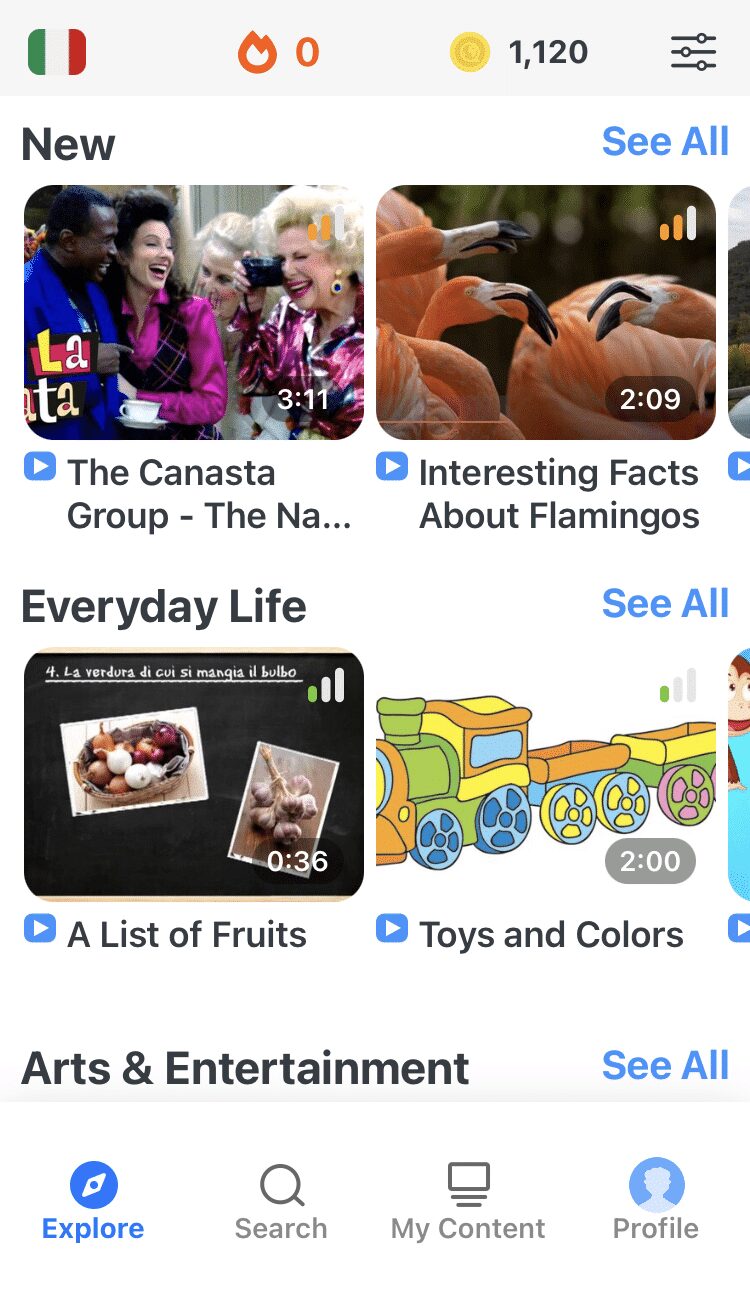
FluentU helps you get comfortable with everyday Italian by combining all the benefits of complete immersion and native-level conversations with interactive subtitles. Tap on any word to instantly see an image, in-context definition, example sentences and other videos in which the word is used.

Access a complete interactive transcript of every video under the Dialogue tab, and review words and phrases with convenient audio clips under Vocab.
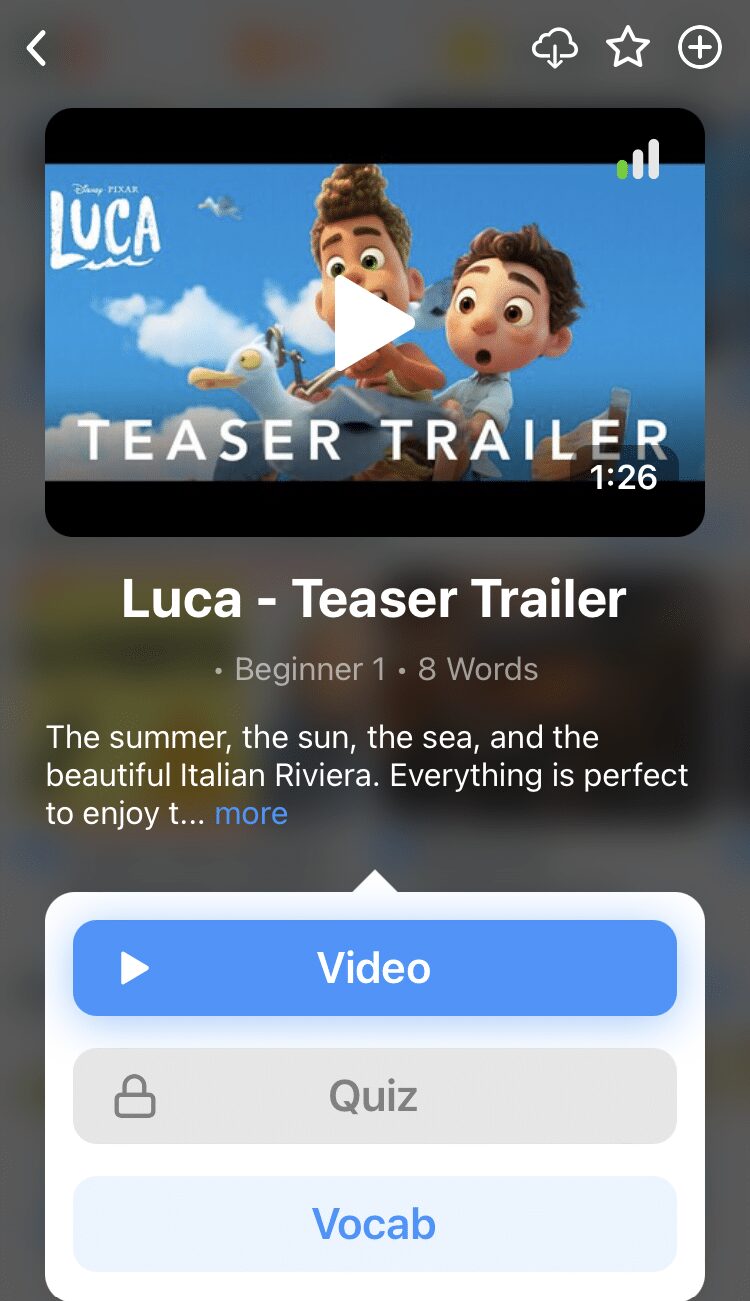
Once you've watched a video, you can use FluentU's quizzes to actively practice all the vocabulary in that video. Swipe left or right to see more examples of the word you’re on.
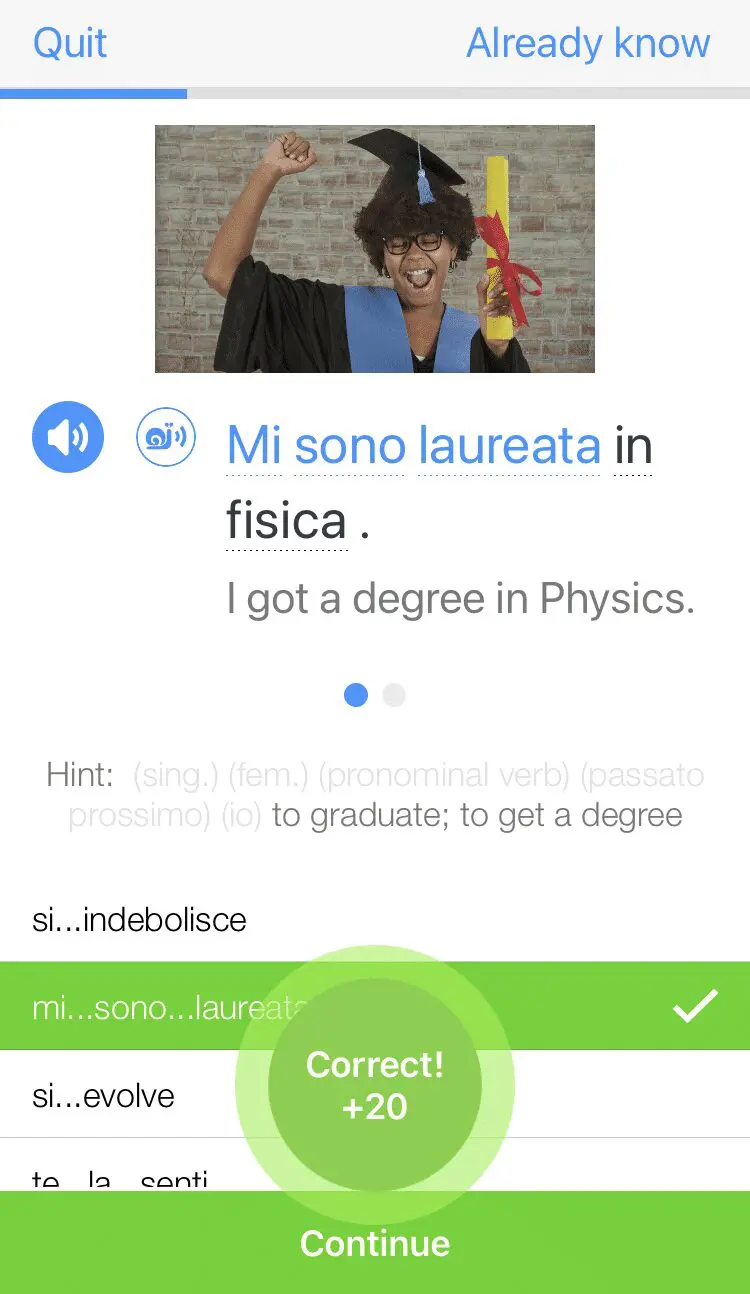
FluentU will even keep track of all the Italian words you’re learning, and give you extra practice with difficult words. Plus, it'll tell you exactly when it's time for review. Now that's a 100% personalized experience!
The best part? You can try FluentU for free with a trial.
Start using the FluentU website on your computer or tablet or, better yet, download the FluentU app from the iTunes or Google Play store. Click here to take advantage of our current sale! (Expires at the end of this month.)

